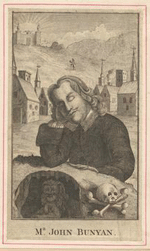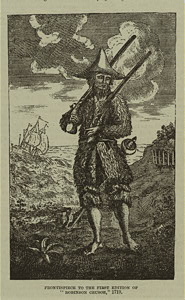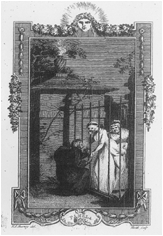E102 B || Winter 2013 || Thinking about Self ||
11:00 am – 12:20 pm Tuesdays & Thursdays in PCB 1200 ||
A. Van Sant || ajvansan@uci.edu ||
Class Mailing List: 23394-W13@classes.uci.edu
Office: 144KH
Office Hours: Tuesday, 12:30-2:30 (extended if students are there)
What is the self? A simple yet very difficult question. The “self” can be defined as “a permanent subject of successive and varying states of consciousness.” On the other hand, we speak of “a former self” or say we feel like “our old selves,” as if the self varies from one time to another. In this course we will read 3 fictions that centralize the representation of a self—John Bunyan’s The Pilgrim’s Progress, 1678 (a spiritual allegory), Daniel Defoe’s Robinson Crusoe, 1719 (a fictional travel account), and Samuel Richardson’s Pamela, 1741, (a novel written in letters). We will also examine illustrations of these fictions to ask what kind of self is delineated in them. In addition, we will consider some philosophical treatments of our question by Augustine (Aurelius Augustinus), Rene Descartes, Thomas Hobbes, John Locke, and David Hume (selections from the web).
Students will write a very short paper and a longer paper and take a final. Students will also write informally to discover their own thinking.
Required Texts
Course requirements
What counts what?
Some useful links
|
John Bunyan, The Pilgrim’s Progress, Oxford World Classics,
Daniel Defoe, Robinson Crusoe, Broadview Press, Samuel Richardson, Pamela, Oxford World Classics, Attendance, keeping up with information on the website, participation, short paper (with commentary), longer paper (with draft and with commentary), and final.
Attendance: Necessary for passing the course Participation: 10% Short paper: 20% Longer Paper: 40 % Final: 30%
John W. Cousin, A Short Biographical Dictionary of English Literature from eBooks@Adelaide. |
|


